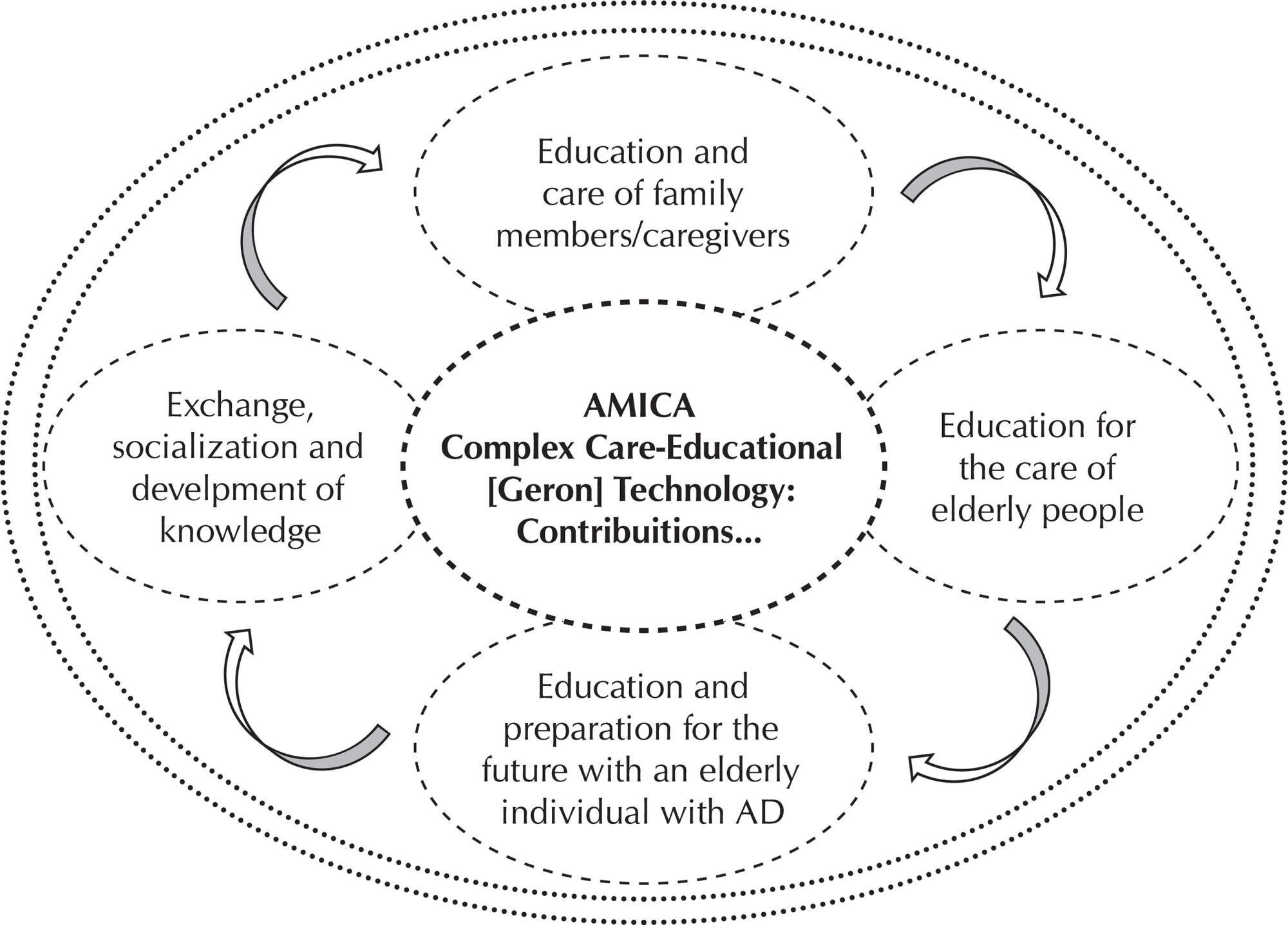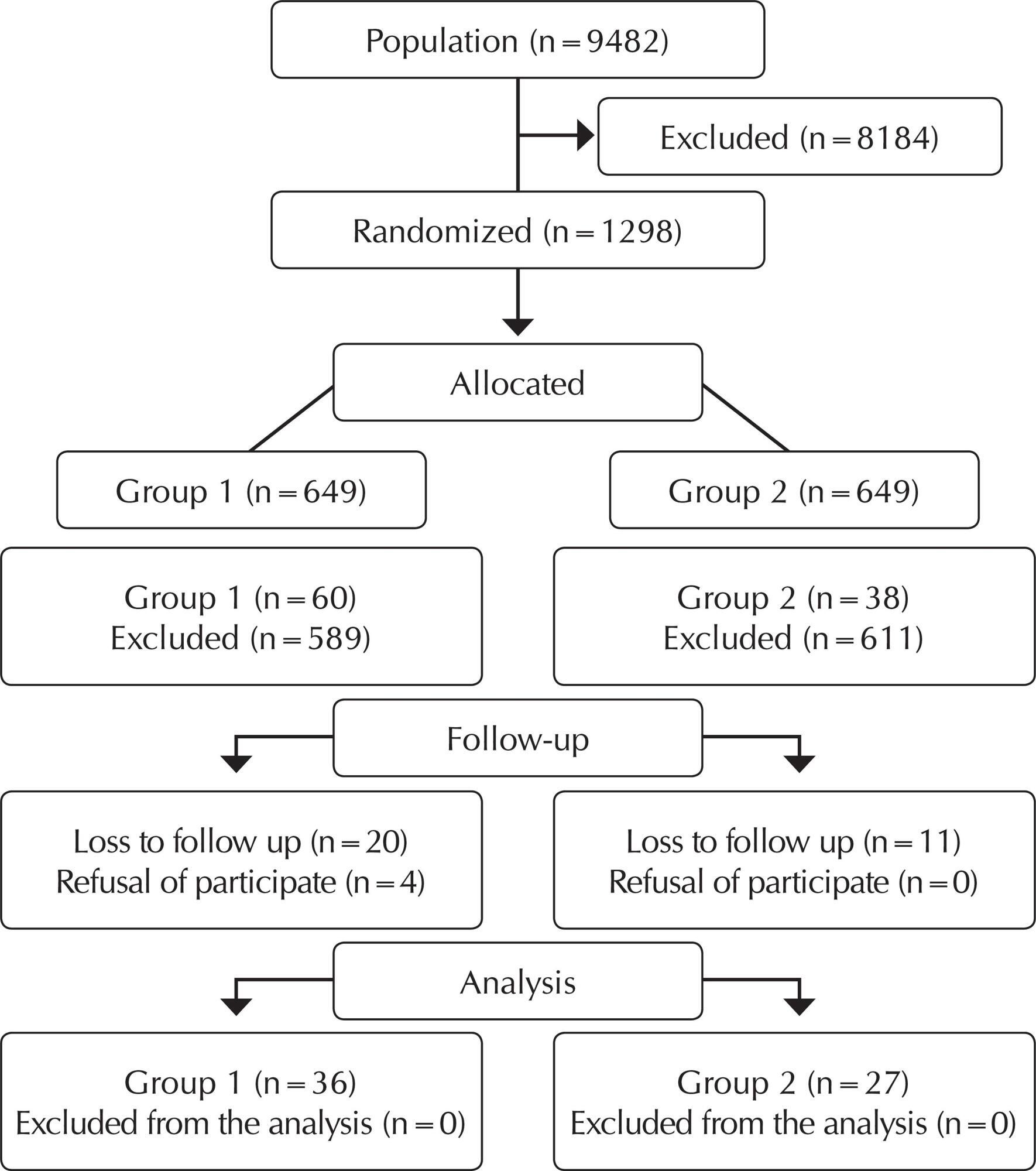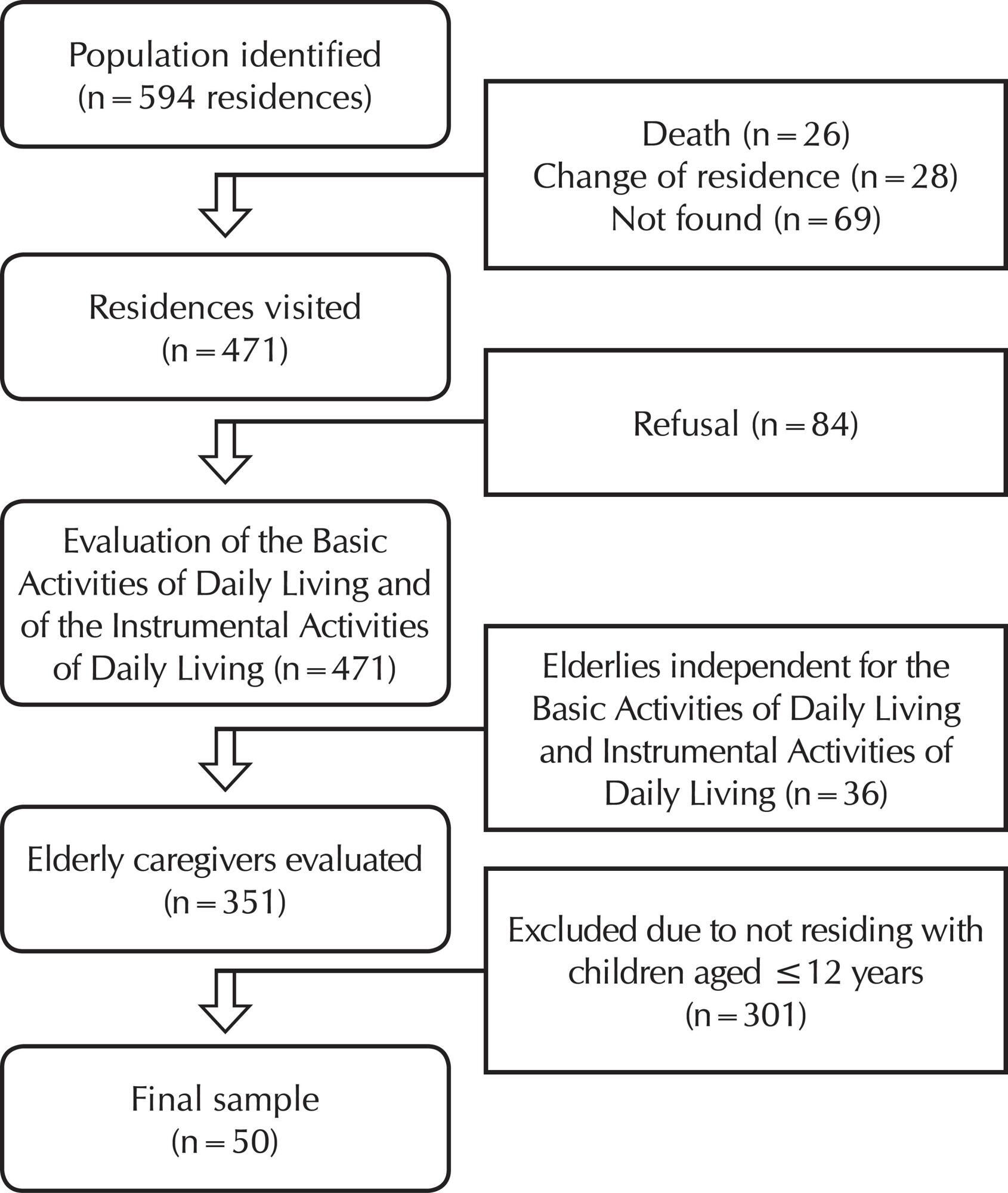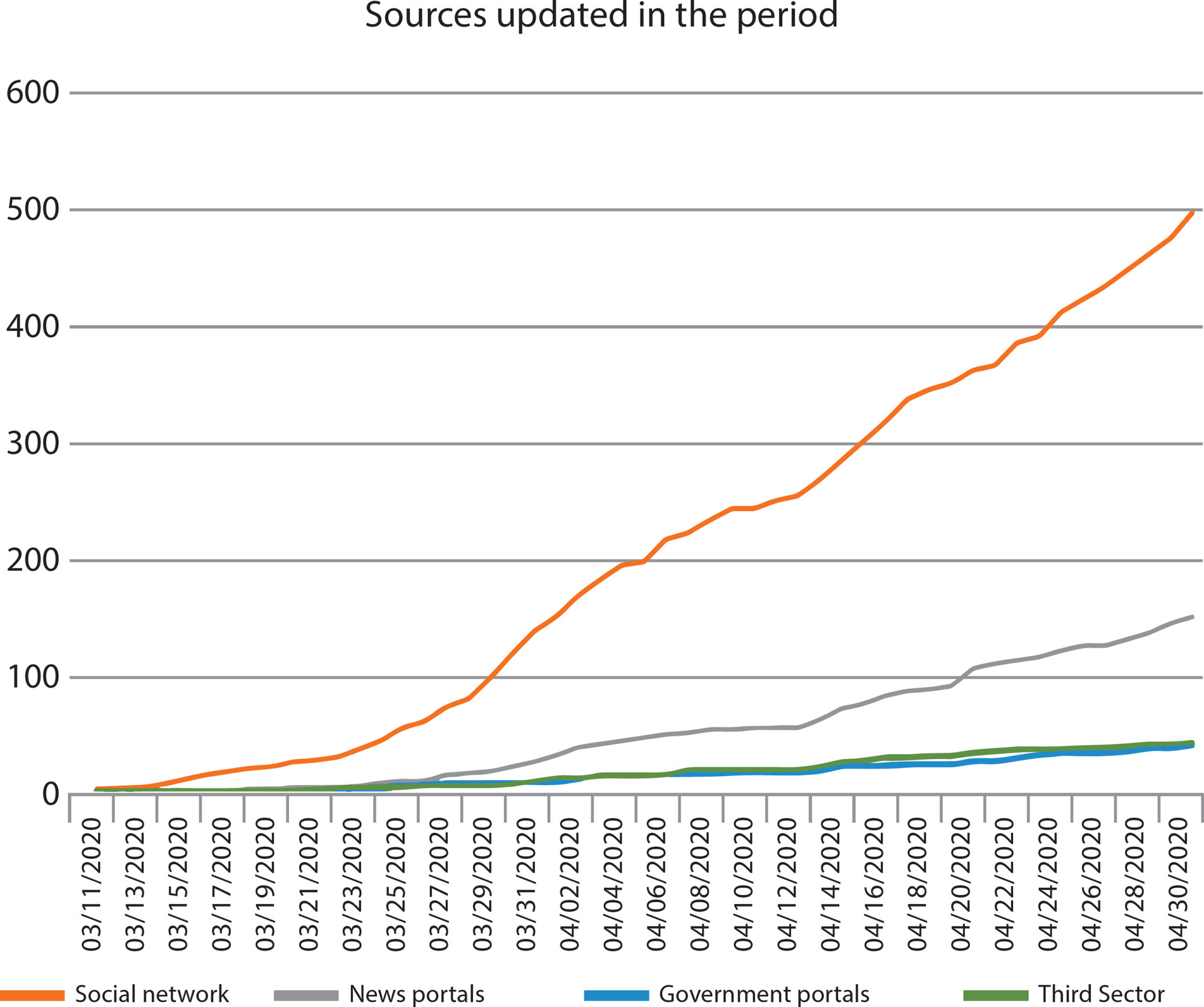-
RESEARCH
Complex educational and care (geron)technology for elderly individuals/families experiencing Alzheimer’s disease
Revista Brasileira de Enfermagem. 2017;70(4):726-732
01-01-2017
Abstract
RESEARCHComplex educational and care (geron)technology for elderly individuals/families experiencing Alzheimer’s disease
Revista Brasileira de Enfermagem. 2017;70(4):726-732
01-01-2017DOI 10.1590/0034-7167-2016-0687
Views0See moreABSTRACT
Objective:
To describe the contributions of the Integrated Multidisciplinary Care Group for Caregivers of Individuals with Alzheimer’s Disease as an educational and care (geron)technology in the context of Alzheimer’s disease in elderly individuals from the perspective of family members/caregivers.
Method:
Exploratory, descriptive study with a qualitative approach conducted with 13 family members/caregivers of elderly people participating in the support group of a university institution of the state of Rio Grande do Sul, Brazil. Data collected between January and April 2016 through a semi-structured interview were submitted to discursive textual analysis.
Results:
Family members/caregivers pointed out education and care as contributions of the group; education for care and for the future; exchange, socialization, and development of knowledge through the range of knowledge existing in the Group.
Conclusion:
The Group contributes as a (geron)technology of care and education for care in which knowledge is built and applied in practice, supporting the experienced disorders and improving the quality of care provided for elderly individuals with Alzheimer’s disease.

-
RESEARCH
Falls in institutionalized older adults: risks, consequences and antecedents
Revista Brasileira de Enfermagem. 2017;70(4):719-725
01-01-2017
Abstract
RESEARCHFalls in institutionalized older adults: risks, consequences and antecedents
Revista Brasileira de Enfermagem. 2017;70(4):719-725
01-01-2017DOI 10.1590/0034-7167-2017-0107
Views0See moreABSTRACT
Objective:
To analyze the occurrence of falls in institutionalized elderly addressing the risks, consequences and antecedents.
Method:
Cross-sectional study carried out with 45 older adults in Long-Term Care Facilities for the Older adult in João Pessoa, Brazil, in June and July 2016. A socio-demographic questionnaire and the Berg Balance Scale were applied, classifying as risk of fall scores lower than 45. Descriptive statistics and tests were conducted: independent t-test, Anova (Tukey), Chi-square, Mann Whitney. Statistically significance was p <0.05. Data were processed in SPSS version 19.0.
Results:
A total of 66.7% (30) falls occurred, 20% (9) of them in the external area, with 66.7% (30) of the participants having hypertension as a previous disease and, as consequence, the fracture was highlighted with 11.2% (5). The Berg Scale had different scores when compared to the falls suffered by the elderly and previous diseases influenced the occurrence of falls (p <0.05).
Conclusion:
It is necessary to implement public financing policies or partnerships that allow environments adaptations aiming at reducing the risks of falls.
-
RESEARCH
Factors associated with the functional capacity of older adults with leprosy
Revista Brasileira de Enfermagem. 2017;70(4):711-718
01-01-2017
Abstract
RESEARCHFactors associated with the functional capacity of older adults with leprosy
Revista Brasileira de Enfermagem. 2017;70(4):711-718
01-01-2017DOI 10.1590/0034-7167-2017-0091
Views0See moreABSTRACT
Objective:
to investigate the association between socio-demographic and clinical factors and the functional capacity of older adults with leprosy.
Method:
cross-sectional analytical study conducted in Fortaleza, Ceará, Brazil, with 77 older adult patients with leprosy in a referral service, through interview, medical records and application of the Katz Index and the Lawton and Brody Scale.
Results:
the mean age was 68.23 years, with prevalence of men, in stable union/married, with mean monthly family income of 2.04 minimum wages, positive bacillary index, clinical dimorphic form and grade zero disability. In the Lawton and Brody scale, independence (58.5%) was predominant and associated to the variables “living arrangement” and “educational attainment”. Total independence (87.0%) was predominant in the Katz Index and statistically associated to the variable monthly family income.
Conclusion:
most of the participants were classified as independent in the instruments used. Furthermore, the instruments pointed to a greater number of associations with socio-demographic and clinical factors not related to leprosy.
-
RESEARCH
Effects of supportive telephone counseling in the metabolic control of elderly people with diabetes mellitus
Revista Brasileira de Enfermagem. 2017;70(4):704-710
01-01-2017
Abstract
RESEARCHEffects of supportive telephone counseling in the metabolic control of elderly people with diabetes mellitus
Revista Brasileira de Enfermagem. 2017;70(4):704-710
01-01-2017DOI 10.1590/0034-7167-2017-0089
Views0See moreABSTRACT
Objective:
the purpose of this study was to evaluate the efficacy of telephone-based support for the metabolic control of elderly patients with diabetes mellitus.
Method:
a pragmatic study was conducted in two groups, called G1 (n=36) and G2 (n=27), at a health unit from the countryside of São Paulo state. Patients in G1 group received telephone support over four months, through 16 telephone contacts with educational material; for the G2 group the educational material was mailed.
Results:
significant differences were found. The G1 group showed a reduction of the parameters of fasting glucose, as well as systolic and diastolic blood pressure. In G2 group a modest reduction was noted in some parameters, with no significant difference.
Conclusion:
telephone support was effective to deliver patient education to the diabetic elderly, leading to the reduction of fasting blood glucose. This, combined with other strategies, can contribute to reduce glycated hemoglobin (NCT 01972412).

-
RESEARCH
Stress and optimism of elderlies who are caregivers for elderlies and live with children
Revista Brasileira de Enfermagem. 2017;70(4):697-703
01-01-2017
Abstract
RESEARCHStress and optimism of elderlies who are caregivers for elderlies and live with children
Revista Brasileira de Enfermagem. 2017;70(4):697-703
01-01-2017DOI 10.1590/0034-7167-2017-0088
Views0See moreABSTRACT
Objective:
to evaluate the relation between stress and optimism of elderlies who are informal caregivers for elderlies and live with children.
Method:
cross-sectional study on 50 elderlies who provide care to elderlies, live with children, and are registered in the primary health care. The interviews occurred in the participant’s residence and we evaluated characteristics of the care-dependent elderly and of the children, sociodemographic characteristics, stress through the Perceived Stress Scale and optimism through the Pinto and Pais-Ribeiro Spirituality Scale, in the elderly caregiver. For statistical analysis we used the Spearman correlation test.
Results:
the mean level of stress was 23.9 points and of optimism was 3.3 points. Correlation analysis showed that the higher the level of optimism the significantly lower the level of perceived stress of elderlies who provided care to elderlies and lived with children.
Conclusion:
inversely proportional correlation was identified between stress and optimism.

-
RESEARCH
Spiritual well-being and quality of life of older adults in hemodialysis
Revista Brasileira de Enfermagem. 2017;70(4):689-696
01-01-2017
Abstract
RESEARCHSpiritual well-being and quality of life of older adults in hemodialysis
Revista Brasileira de Enfermagem. 2017;70(4):689-696
01-01-2017DOI 10.1590/0034-7167-2017-0006
Views0See moreABSTRACT
Objective:
To analyze the relationship between spiritual well-being, sociodemographic, economic, religious, and health variables and the quality of life of older adults undergoing hemodialysis.
Method:
This was a cross-sectional and correlational study conducted with 169 older adults undergoing hemodialysis. The researchers conducted interviews to collect sociodemographic, economic, religious, and health data and applied the Spiritual Well-Being Scale (SWBS) and the WHO quality of life assessment (WHOQOL-BREF and WHOQOL-OLD).
Results:
Most of the older adults attained a moderate level of total spiritual well-being (SWB). In terms of QOL, the psychological domain (66.8; sd=13.9) and social relationships domain (66.8; sd=15.1) presented the highest mean scores. The WHOQOL-BREF domains were positively correlated with the SWB scale, with statistical significance among all domains and subscales except the environmental domain.
Conclusion:
The QOL of older adults was associated with the construct of SWB, either positively or negatively.
-
RESEARCH
Vulnerability of caregivers of the elderly with dementia: a cross-sectional descriptive study
Revista Brasileira de Enfermagem. 2017;70(4):682-688
01-01-2017
Abstract
RESEARCHVulnerability of caregivers of the elderly with dementia: a cross-sectional descriptive study
Revista Brasileira de Enfermagem. 2017;70(4):682-688
01-01-2017DOI 10.1590/0034-7167-2016-0579
Views0See moreABSTRACT
Objective:
to evaluate the sociodemographic and clinical profile of the caregivers and its relation with the overburden from the care of the elderly with dementia.
Method:
a cross-sectional descriptive study; the sample was non-probabilistic, developed with caregivers of elderly people with dementia. The field of investigation was the Health Care Center of the Elderly and their Caregivers (CASIC), in the city of Niterói, Rio de Janeiro, Brazil. Data collection took place from February to June 2016, with the following instruments: a sociodemographic questionnaire and Zarit scale.
Results:
fifty percent of the caregivers presented moderate overburden; 38% presented little overburden; and 12% moderate/severe overburden. It was observed that the median of weekly care hours increases as the overburden increases. Caregivers with moderate to severe overburden, in the majority, do not share care.
Conclusion:
it is clear that the overburden of care places the caregiver in conditions of biological and psychological vulnerability.
-
RESEARCH
Therapeutic nursing care: transition in sexuality of the elderly caregiving spouse
Revista Brasileira de Enfermagem. 2017;70(4):673-681
01-01-2017
Abstract
RESEARCHTherapeutic nursing care: transition in sexuality of the elderly caregiving spouse
Revista Brasileira de Enfermagem. 2017;70(4):673-681
01-01-2017DOI 10.1590/0034-7167-2016-0256
Views0See moreABSTRACT
Objective:
To understand the transitions experienced, and the conditions and expected response patterns to changes in sexuality of the spouse-caregiver of the elderly, during progression of the dementia process.
Method:
A qualitative research study, conducted at the neurogeriatric clinic between May of 2014 and May of 2015. An intensive, individual interview was administered to 12 elderly caregivers. Thematic content analysis was applied, using the theoretical model of Transition Theory.
Results:
Seven categories emerged, involving relationship and conjugal sexuality; disease repercussions; care and professional approach; attitudes, beliefs and social imagery of sexuality and care; family relationship and redefining of sexuality.
Final considerations:
Family development and marital life, the aspects of formation and development of sexuality, the specifics that involved living and caring for the other were understood, with successive events and changes influenced by old age, dementia, beliefs and social imagery.
-
ORIGINAL ARTICLE
Religious/spiritual coping and spiritual distress in people with cancer
Revista Brasileira de Enfermagem. 2019;72(6):1534-1540
10-21-2019
Abstract
ORIGINAL ARTICLEReligious/spiritual coping and spiritual distress in people with cancer
Revista Brasileira de Enfermagem. 2019;72(6):1534-1540
10-21-2019DOI 10.1590/0034-7167-2018-0585
Views0See moreABSTRACT
Objective:
To investigate the relation between the presence of spiritual distress and use of RSC and sociodemographic, clinical and religious/spiritual variables in people with cancer.
Method:
Cross-sectional study conducted in an association for support to people with cancer. The data obtained with the tools were analyzed using the Spearman‘s correlation coefficient and the Mann-Whitney Test.
Results:
129 volunteers participated in the study, of which 57% showed moderate spiritual distress, 96% used medium and high positive religious/spiritual coping. Spiritual distress showed positive correlation with negative religious/spiritual coping (P<0.001) and inverse correlation with age (p 0.002). The use of positive religious coping was statistically significant in people who have religious practices (p 0.001).
Conclusão:
Spiritual distress is a phenomenon that is present in the lives of people with cancer and has significant relation with the use, in a negative manner, of religion/spirituality as a way of coping with the disease.
-
ORIGINAL ARTICLE
Social incentives for adherence to tuberculosis treatment
Revista Brasileira de Enfermagem. 2019;72(5):1182-1188
09-16-2019
Abstract
ORIGINAL ARTICLESocial incentives for adherence to tuberculosis treatment
Revista Brasileira de Enfermagem. 2019;72(5):1182-1188
09-16-2019DOI 10.1590/0034-7167-2017-0654
Views0See moreABSTRACT
Objective:
To analyze the influence of social incentives for adherence to tuberculosis (TB) treatment.
Method:
Qualitative study, in which 26 primary health care professionals of São Paulo were interviewed in 2015.Their testimonies were submitted to the speech analysis technique. The theoretical reference was the social determination of the health-disease process. Ethical procedures were observed.
Results:
TB is related to precarious living conditions. Incentives such as the basic food basket and transportation stipends are relevant for patients’ adherence to treatment, as well as to the create bonds between the patient and the health team.
Final considerations:
The incentives strengthened adherence to TB treatment. However, interventions in the context of public measures must transcend the remedial dimension and be guided towards the transformation of the TB situation, which means supporting processes that modify living conditions.
-
ORIGINAL ARTICLE
Homeless population: characterization and contextualization by census research
Revista Brasileira de Enfermagem. 2020;73(5):e20190236
07-01-2020
Abstract
ORIGINAL ARTICLEHomeless population: characterization and contextualization by census research
Revista Brasileira de Enfermagem. 2020;73(5):e20190236
07-01-2020DOI 10.1590/0034-7167-2019-0236
Views0See moreABSTRACT
Objectives:
to analyze characteristics of homeless people and factors associated with living on the streets.
Methods:
a census-type sectional survey carried out between 2015 and 2018, in the municipality of Maringá-Paraná. A total of 701 homeless answered a structured questionnaire with sociodemographic data, living conditions, and drug use. We used Pearson’s correlation test for the association analysis of the variables at a 95% confidence level.
Results:
men (90.7%) the average age of 37.7 years had been homeless for an average of 5.39 years. Most had little education (54.2%), and homelessness was due to drug use (47.2%) and family disagreements (38.9%).
Conclusions:
drug use and family disagreements were the main reasons for homelessness. Time on the street, gender, and drugs were associated with a negative correlation to be homeless; and age, mean daily income, the number of daily meals, having been in prison, and having an income source were associated with positive correlation.
-
REFLECTION
Florence Nightingale’s theory and her contributions to holistic critical thinking in nursing
Revista Brasileira de Enfermagem. 2021;74(2):e20200139
05-03-2021
Abstract
REFLECTIONFlorence Nightingale’s theory and her contributions to holistic critical thinking in nursing
Revista Brasileira de Enfermagem. 2021;74(2):e20200139
05-03-2021DOI 10.1590/0034-7167-2020-0139
Views0See moreABSTRACT
Objective:
to reflect on Florence Nightingale’s legacy and describe her contributions to critical holistic thinking in nursing.
Methods:
this is a theoretical reflection, for which scientific productions on Florence Nightingale’s environmental theory, as published in national and international journals, were based.
Results:
Florence Nightingale’s philosophy and teachings emphasize that the nurse must use her brain, heart and hands to create healing environments to care for the patient’s body, mind and spirit. Nursing, since the time of Nightingale, has been building the holistic paradigm, in all schools of thought, with a view to a humanistic approach to the human being in their indivisible relationship with the environment.
Final considerations:
Florence’s contributions to holistic critical thinking in nursing are evident, constituting nurses’ differential in clinical practice.
-
REVIEW
Barriers to Pre-Exposure Prophylaxis (PrEP) use for HIV: an integrative review
Revista Brasileira de Enfermagem. 2023;76(3):e20210963
06-26-2023
Abstract
REVIEWBarriers to Pre-Exposure Prophylaxis (PrEP) use for HIV: an integrative review
Revista Brasileira de Enfermagem. 2023;76(3):e20210963
06-26-2023DOI 10.1590/0034-7167-2021-0963
Views0ABSTRACT
Objectives:
to identify and synthesize scientific evidence on the barriers and difficulties for Pre-exposure Prophylaxis (PrEP) use and compliance for HIV.
Methods:
an integrative literature review, using the MEDLINE/PubMed, Cumulative Index to Nursing and Allied Health Literature (CINAHL), Academic Search Premier and Scopus (Elsevier) databases.
Results:
all (100%) the articles included identified that PrEP users experience some type of structural barrier related to health services such as long distance from the units, suboptimal logistics for taking pills and professional resistance to prescribing PrEP. Furthermore, 63.21% identified social barriers, such as stigma about sexuality and HIV, in addition to individual barriers such as alcohol use, adverse effects, and concerns about long-term toxicity.
Conclusions:
the barriers to PrEP use are multifactorial. Effective interventions are needed to support PrEP users in accessing, complying with, and retaining health services.
Keywords:Access to Health ServicesAnti-HIV AgentsPre-Exposure ProphylaxisPrevention and ControlSexual HealthSee more
-
Fear of childbirth in time of the new coronavirus pandemic
Revista Brasileira de Enfermagem. 2020;73:e20200551
11-13-2020
Abstract
Fear of childbirth in time of the new coronavirus pandemic
Revista Brasileira de Enfermagem. 2020;73:e20200551
11-13-2020DOI 10.1590/0034-7167-2020-0551
Views0See moreABSTRACT
Objective:
Reflect on how the new coronavirus pandemic triggered or accentuated the fear of childbirth in pregnant women and affected childbirth care practices.
Methods:
Reflective analysis of women’s pregnancy and childbirth experiences during the current pandemic, supported by the latest scientific evidence and recommendations on the topic.
Results:
Pregnancy and childbirth are life-changing events for women, but during the new coronavirus pandemic, fear and uncertainty have taken on an unprecedented dimension in the negative way that many pregnant women have anticipated and experienced childbirth.
Final considerations:
The current period has accentuated a chronic problem: a paternalistic system of health institutions in the approach to childbirth, dense with additional levels of fear in pregnant women. In this context, addressing the fear of childbirth means not giving up the promotion of safe and positive birth experiences for women.

-
EXPERIENCE REPORT
Brazilian Nursing Process Research Network contributions for assistance in the COVID-19 pandemic
Revista Brasileira de Enfermagem. 2020;73:e20200798
10-26-2020
Abstract
EXPERIENCE REPORTBrazilian Nursing Process Research Network contributions for assistance in the COVID-19 pandemic
Revista Brasileira de Enfermagem. 2020;73:e20200798
10-26-2020DOI 10.1590/0034-7167-2020-0798
Views0ABSTRACT
Objective:
to describe the theoretical construction process of nursing process support documents in COVID-19 care scenarios.
Methods:
an experience report of the joint activity of the Brazilian Nursing Process Research Network (Rede de Pesquisa em Processo de Enfermagem) composed of Higher Education and Health Institution researchers in Brazil.
Results:
five instruments were organized collectively, involving the elements of nursing practice (nursing diagnoses, outcomes and interventions) in assistance for community; for patients (with suspected or mild, moderate, and critical COVID-19 and residents in Nursing Homes); for nursing workers’ health support, also subsidizing registration and documentation during the COVID-19 pandemic.
Final considerations:
valuing the phenomena manifested by families/communities, patients and health professionals is essential for early detection, intervention, and prevention of diseases.
Keywords:Coronavirus InfectionsDelivery of Health CareNursing DiagnosisNursing ProcessStandardized Nursing TerminologySee more -
Domestic violence against women amidst the pandemic: coping strategies disseminated by digital media
Revista Brasileira de Enfermagem. 2021;74:e20200631
01-29-2021
Abstract
Domestic violence against women amidst the pandemic: coping strategies disseminated by digital media
Revista Brasileira de Enfermagem. 2021;74:e20200631
01-29-2021DOI 10.1590/0034-7167-2020-0631
Views0See moreABSTRACT
Objective:
to know the strategies to cope with domestic violence against women disseminated by digital media at the beginning of the COVID-19 pandemic.
Methods:
a documentary study with a qualitative approach. The search took place from March 11 to April 30, 2020, from four sources: newspapers and online portals, social network, official government pages and third sector portals. Thematic content analysis of the findings was performed.
Results:
seventy-seven strategies were identified in the journalistic press, 93 in the social network, 45 in government portals and 40 in third sector organizations. From analysis, three empirical categories emerged: Strategies for communication with women; Strategies adopted by customer service; Strategies to inform the population.
Final considerations:
most of strategies were adaptations of existing services, centered on the reporting of violence by women

Search
Search in:
Nuvem de Tags
Aged (144) Atenção Primária à Saúde (239) COVID-19 (104) Cuidados de Enfermagem (269) Educação em Enfermagem (151) Educação em Saúde (139) Enfermagem (930) Estudos de Validação (131) Health Education (144) Idoso (208) Mental Health (149) Nursing (987) Nursing Care (306) Patient Safety (151) Primary Health Care (284) Qualidade de Vida (104) Quality of Life (106) Saúde Mental (145) Segurança do Paciente (150) Validation Studies (108)



